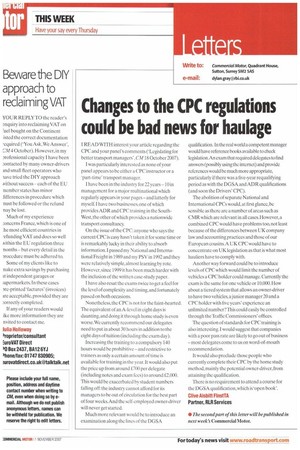Changes to the CPC regulations could be bad news for haulage
Page 26

If you've noticed an error in this article please click here to report it so we can fix it.
I READ WITH interest your article regarding the CPC and your panel's comments ('Legislating for better transport managers', CM 18 October 2007).
I was particularly interested as none of your panel appears to be either a CPC instructor or a 'part-time' transport manager.
I have been in the industry for 22 years-10 in management for a major multinational which regularly appears in your pages— and latterly for myself. I have two businesses, one of which provides ADR and CPC training in the SouthWest, the other of which provides a nationwide transport consultancy.
On the issue of the CPC: anyone who says the current CPC is easy hasn't taken it for some time or is remarkably lucky in their ability to absorb information. I passed my National and International Freight in 1989 and my PSV in 1992 and they were relatively simple, almost learning by rote. However, since 1999 it has been much harder with the inclusion of the written case-study paper.
I have also resat the exams twice to get a feel for the level of complexity and timing, and fortunately passed on both occasions.
Nonetheless, the CPC is not for the faint-hearted. The equivalent of an A-level in eight days is daunting, and doing it through home study is even worse.We currently recommend our delegates need to put in about 30 hours in addition to the eight days of tuition (including the exam day).
Increasing the training to a compulsory 140 hours would be prohibitive — and restrictive to trainers as only a certain amount of time is available for training in the year. It would also put the price up from around £700 per delegate (including notes and exam fees) to around £2,000. This would be exacerbated by student numbers falling off: the industry cannot afford for its managers to be out of circulation for the best part of four weeks. And the self-employed owner-driver will never get started.
Much more relevant would be to introduce an examination along the lines of the DGSA qualification. In the real world a competent manager would have reference books available to check legislation.An exam that required delegates to find answers (possibly using the interne° and provide references would be much more appropriate, particularly if there was a five-year requalifying period as with the DGSA and ADR qualifications (and soon the Drivers' CPC).
The abolition of separate National and International CPCs would, at first glance, be sensible as there are a number of areas such as CMR which are relevant in all cases. However, a combined CPC would have problems too, not least because of the differences between UK company law and accounting practices and those of our European cousins.A UK CPC would have to concentrate on UK legislation as that is what most hauliers have to comply with.
Another way forward could be to introduce levels of CPC which would limit the number of vehicles a CPC holder could manage. Currently the exam is the same for one vehicle or 10,000. How about a tiered system that allows an owner-driver to have two vehicles, a junior manager 20 and a CPC holder with five years' experience an unlimited number? This could easily be controlled through the Traffic Commissioners' offices.
The question of standards for CPC training is also interesting. 1 would suggest that companies with a poor pass rate are likely to go out of business — most delegates come to us on word-of-mouth recommendation.
It would also preclude those people who currently complete their CPC by the home study method, mainly the potential owner-driver, from attaining the qualification.
There is no requirement to attend a course for the DGSA qualification, which is 'open book'.
Clive Aisbift FlnstTA Partner, RLR Services






















































































































































































